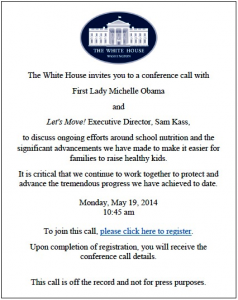Historic! First Lady and President actively support school nutrition standards
Today, the House Appropriations Committee will discuss the annual spending bill for the Agriculture Department, meaning that it will consider proposals to weaken nutrition standards for school meals.
In what has to be a groundbreaking move, First Lady Michelle Obama has an Op-Ed in today’s New York Times.
Yet some members of the House of Representatives are now threatening to roll back these new standards and lower the quality of food our kids get in school. They want to make it optional, not mandatory, for schools to serve fruits and vegetables to our kids. They also want to allow more sodium and fewer whole grains than recommended into school lunches.
…Remember a few years ago when Congress declared that the sauce on a slice of pizza should count as a vegetable in school lunches? You don’t have to be a nutritionist to know that this doesn’t make much sense. Yet we’re seeing the same thing happening again with these new efforts to lower nutrition standards in our schools.
Our children deserve so much better than this.
Yes, they do, and how terrific that she is saying this.
Also a must read is ObamaFoodorama’s account of the President’s position on all this. From White House press secretary Jay Carney:
It is “inappropriate to let politics and pressure from the food industry” change federal law.
“The President and First Lady both feel very strongly about the need to continue moving forward when it comes to school nutrition and not allowing politics to pull us backward,” Carney said.
Carney made his comments during a gaggle aboard Air Force One when asked about the President’s “reaction” to the First Lady’s event on Tuesday with school nutrition pros.
For a nutritionist like me, this is history in the making. Cheers to both and let’s hope their efforts work.
Addition, June 2: If you cannot understand why the School Nutrition Association is pushing for the waiver and elimination of the rules, see Jerry Hagstrom’s lucid explanation: they don’t cook.
When the school-lunch program started, most schools cooked their own food. As the number of children participating in the school-lunch program grew, the need to provide more food led the schools to buy prepackaged, processed food, which led to the companies making those foods becoming big players within SNA. Under the new rules, those companies have to come up with tasty products with less salt, sugar, and fat and use whole grains. At the same time, the fruit and vegetable requirements—which bring more business to the United Fresh Produce Association—threaten to take up more of the school-lunch budget.



